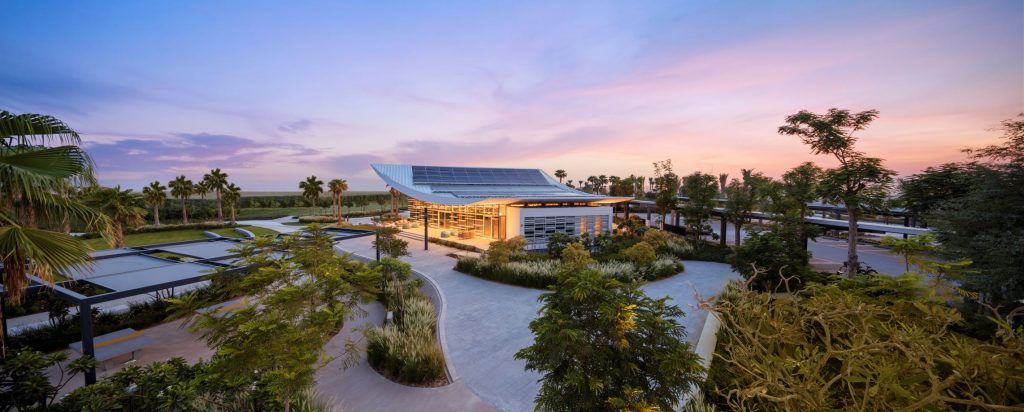Majid Al Futtaim, the leading shopping mall, communities, retail and leisure pioneer across the Middle East, Africa and Asia, made significant strides toward environmental, social, and corporate governance (ESG) issues in 2021, according to its latest ESG report ‘Dare Together’.
In alignment with the UAE Government’s national strategic Net Zero targets, the Company advanced towards its target to be Net Positive in carbon by 2040 – becoming one of the first three signatories to the World Green Building Council’s Net Zero Carbon Buildings Commitment.
Key achievements across the year include securing a $1.5 billion Sustainability-Linked Loan (SLL), a first in the region, dependent on measurable improvements on specific yearly targets that seek to positively impact people and the planet. As part of the SLL, Majid Al Futtaim will work to ensure its entire shopping mall portfolio is certified by 2026, with non-certified malls achieving a minimum of LEED Gold or equivalent.
Sustainable buildings remain a focal point in the Company’s ambitions; the report notes it holds the world’s first LEED Platinum certification for its hotel portfolio, and Mall of Oman is its first superregional mall to be LEED Platinum certified. Total assets with a LEED, BREEAM or equivalent certification in 2021 are 45 (up from 35 in 2020), while total assets in the process of being certified in 2021 are 20 (up from 12 in 2020).
As climate change continues to rank highly on the global agenda, Majid Al Futtaim Properties’ near and long-term greenhouse gas emissions (GHG) targets have been validated by the Science Based Targets initiative (SBTi) to support its transition to Net Positive. The Company also signed up to the Business Ambition for 1.5°C Commitment, requiring emissions reductions of 50% by 2030 and to reach net-zero by 2050 at the very latest. This target covers all GHG emissions across the Majid Al Futtaim business.
Ibrahim Al-Zu’bi, Chief Sustainability Officer, Majid Al Futtaim – Holding, said: “The rise of ESG on the corporate agenda has transitioned quickly from a niche interest to a mainstream requirement for companies seeking to lead across all industries today. With ethical buying and sustainability gaining importance for consumers, we want to create a positive impact in everything we do, from our local communities and the organisations we partner with, to the products we procure, and sell.
“In that regard, our 2021 report reveals our most recent accomplishments and represents a milestone in our journey to become Net Positive in carbon by 2040. Our team is unified in its vision with a tenfold growth ambition over the next decade, focussed on discovering new opportunities, expanding consciously towards a more connected, sustainable, and equitable future for all.”
With the ever-increasing need for clean energy solutions worldwide, Majid Al Futtaim also notably advanced its renewable energy progress during 2021, with its shopping malls, communities and retail assets growing their renewable energy generation to 21.4 million kWh compared to 17 million kWh in 2020, an increase of 26%. Furthermore, a new solar park in Jordan became operational last year, comprising more than 49,000 solar panels and providing 100% of the energy use of 35 Carrefour stores across the country with renewable supply. A second agreement was also signed, which will provide the largest private solar plant in the Kingdom of Bahrain once developed, spanning over 40,000 m² and generating 50% of the shopping mall’s energy consumption needs.
Creating a future free of single-use plastic waste remains a priority for companies around the world – including Majid Al Futtaim, as the report highlights progress in the roll-out of the Single-Use Plastics Phase-out Policy. The latest figures show that Carrefour Armenia phased out all single-use plastic bags in 2021, offering customers a variety of reusable alternatives. Majid Al Futtaim – Retail has also completely phased out single-use plastic bags in seven countries of operation. Additionally, a Dubai-based air-to-water pilot began in 2021 to explore hydro-panel technology and solar power to generate clean drinking water from air. Ten hydro-panels are now installed, each producing an average of four litres of water per day using solar energy and having the capacity to store 40 litres of water.
Majid Al Futtaim continued to progress in various existing areas of ESG importance, including a series of initiatives focused on the professional advancement of its local talent, namely the Company’s commitment to recruit 3,000 Emiratis seeking to build their careers in the private sector throughout the coming years, and the launch of region’s first private sector women coders programme seeking to reach over 5,000 women in tech in the next five years. A pledge has also been made to increase the representation of women in leadership positions to 30% by 2025 and to employ over 35% of women in advanced technologies and digital roles by 2023.
As the first company in the Middle East and the first of 62 organisations worldwide to sign up to the World Economic Forum’s Stakeholder Capitalism Metrics, Majid Al Futtaim adheres to its transparent reporting on performance against a globally aligned set of environmental, social and governance indicators.

